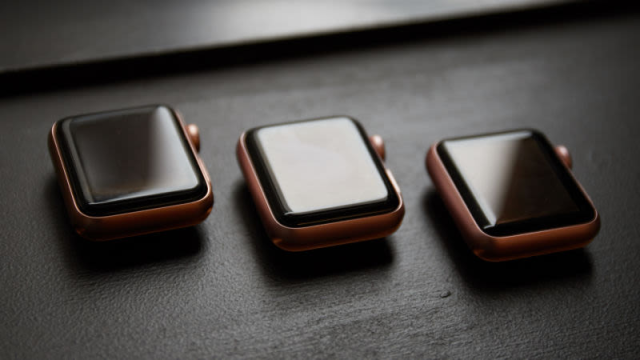The data that fitness trackers collect about your body goes far beyond just how many steps you’ve taken, and researchers are just beginning to understand how to harness all that valuable data-collecting power.
Image: Alex Cranz/ Gizmodo
A new study from the health startup Cardiogram and UCSF suggests that off-the-shelf wearables such as the Apple Watch and Fitbit could be used to accurately detect common conditions such as hypertension and sleep apnea. It’s only the latest example in a string of recent studies in which researchers have tapped into the biosensors of wearables to turn them into devices that can detect and monitor serious health conditions.
In the new study, presented yesterday at the American Heart Association’s annual Scientific Sessions, over 6000 users of the Cardiogram app were recruited to participate in UCSF’s Health eHeart Study. Of them, 2230 participants had been diagnosed with hypertension and 1016 had sleep apnea. Researchers trained a machine learning algorithm called DeepHeart on data from 70 per cent of participants, both those with sleep apnea and hypertension and those without. They then tested the algorithm on the remaining 30 per cent of participants. About 90 per cent of the time it was able to accurately detect those with sleep apnea; 82 per cent of the time it accurately detected hypertension.
That level of accuracy, the researchers concluded, was high enough to serve as an initial screening, with a traditional doctor’s diagnosis getting the final say. The idea is that your Fitbit or AppleWatch’s heart rate sensor would automatically, constantly screen for those conditions, and flag you to visit the doctor if the algorithm detected anything abnormal.
This was the second collaboration between UCSF and Cardiogram. In their first effort, they similarly found that the Apple Watch could detect a serious but often symptomless type of heart arrhythmia, atrial fibrillation.
In another recent study, researchers at Stanford University designed an algorithm that can sift through hours of heart rhythm data gathered by wearable monitors to determine whether a patient has an irregular heartbeat.
Part of the goal of the work is to determine whether technology like the Apple Watch can even be useful for health at all.
“Simply marketing this as health tech is not sufficient. Companies should be working with clinical researchers to figure out unmet healthcare needs and what works for patients,” senior study author Gregory Marcus, the director of clinical research for UCSF’s cardiology department, told Gizmodo after the initial study.
So far, it seems like the answer may be that the Apple Watch really might be useful.
But in addition to more studies to confirm diagnostic accuracy, researchers will also have to study whether tracking health metrics such as heart conditions will actually wind up leading to a positive change in consumer health. While doctors and some insurers have promoted the Apple Watch as a tool for encouraging healthy behaviour, it’s not clear that it actually is. One study last year found that people who wore trackers for 18 months while trying to lose weight actually lost less weight than people who didn’t and were untracked.
